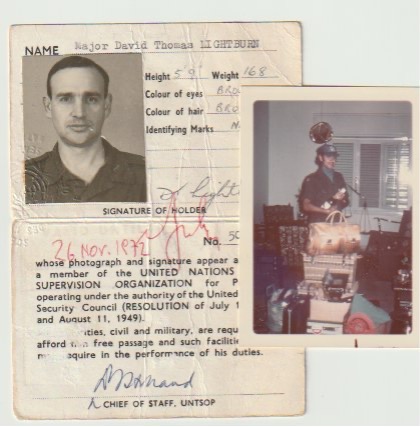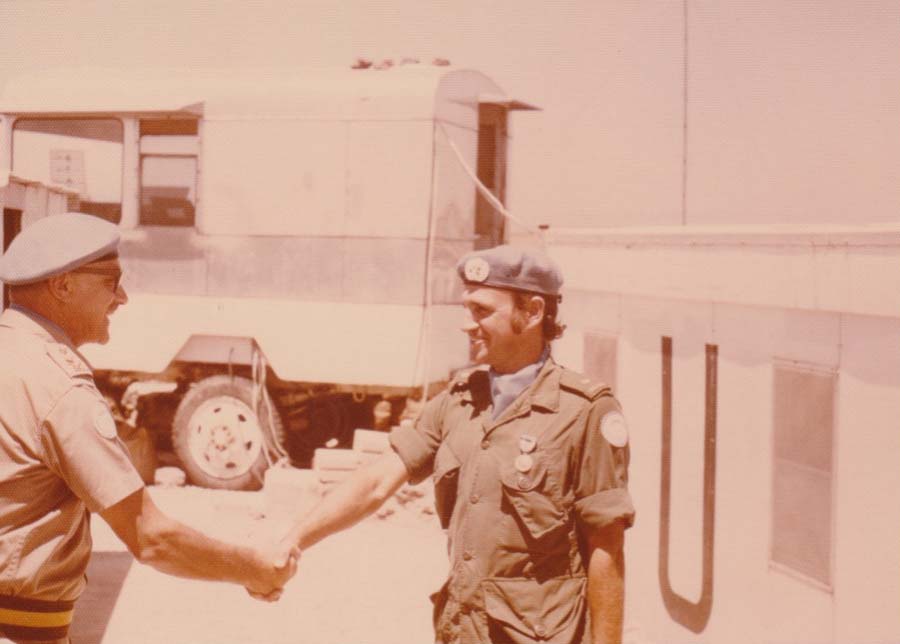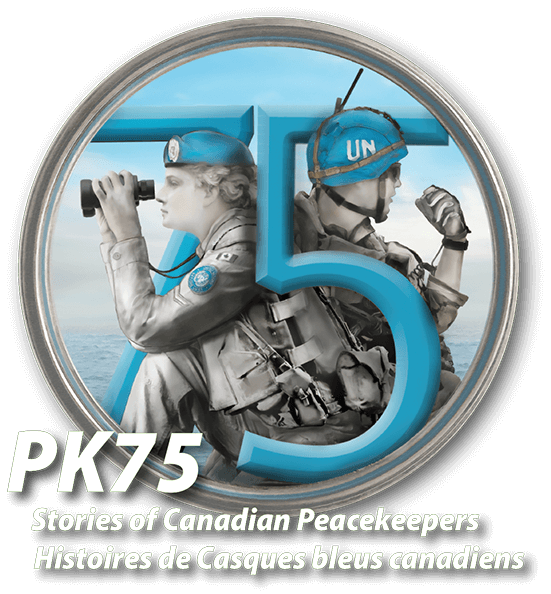

Cobourg, ON, Canada
David Lightburn
Current Location: Hasselt, Hasselt, Belgium
UNTSO (AND BEYOND)
My sole traditional UN peacekeeping mission in a 30-year military career was as an observer with UNTSO on the Golan Heights; six months each on the Israeli and Syrian sides of the border.
After some 10 years in the army, when officials decided to send me out as a peacekeeper, the system suddenly realised that I was not a ‘real Canadian’; rather the immigrant who was still ‘a British subject resident in Canada’. Consequently, within a week, my citizenship was fast-tracked and paid for by the government. Moreover, in order to become a UN observer, one had to be able to drive a ‘stick-shift’ and my sole experience for that was driving a Centurion tank during basic armour training. Accordingly, I spent a few days in the Petawawa training area as an 8CH major learning to drive, in order to be an observer.
A memorable Observation Post (OP) experience was on one of the two out of four days that I was responsible for all cooking for me and my OP partner. I roasted a whole chicken and forgot to remove the plastic bag containing the giblets. To this day, there is an Italian army officer who still believes that that is the way Canadians roast chickens! I think, however, if there was one serious experience and takeaway memory it was on the Syrian side, whereby when one drove to the OP and, along the way passed through Palestinian areas, some very young boys with older boys holding their hands tossed stones at our vehicles — nothing serious and no damages or injuries, just a token signal. But, it taught me that education systems can be the root cause of bigger problems later.
Since my early UNTSO days the world’s peacekeeping has significantly expanded, engaging multiple and diverse international partners and local authorities. I have benefited from a wide range of practical experiences as a member of the Alliance’s Bosnia/Balkans Task Force, including diverse operational challenges on the ground, as well as informed and educational discussions and cooperation with key players in Brussels, Vienna, Geneva, Zagreb, Sarajevo, Skopje, New York and Washington. In Bosnia itself, understanding and working with the operations of the UN, several UN Agencies, the Organization for Security and Co-operation in Europe (OSCE), European Union, Bosnian government authorities, the international High Representative in Bosnia, the Bosnian Contact Group, and many non-government organisations and roving national Ambassadors have been critical to my understanding of the complex world today of ‘peacekeeping’.
Such experiences also enabled me, over several years, to put pen to paper. I have been published in several editions of the NATO Review, two editions of the Canadian Defence Quarterly and a book (After Rwanda), on matters related to Bosnia and to cooperation, coordination, and partnerships in peace operations. Subsequently I authored an ‘Exercise Whitebook’ on behalf of Swedish authorities. It is a guide for developing international civilian/military/police education and training based mainly on my experiences in Bosnia and Kosovo and with Swedish training exercise Viking.
Finally, my reflections on my peacekeeping experiences would be incomplete if I did not mention my personal time engaging one-on-one with the face of UN Peacekeeping — Kofi Annan. On six separate occasions I worked with him. The first two occasions in 1995 and 1996 I was part of a small NATO team visiting the UN when he was Under-Secretary General for Peacekeeping, to discuss NATO and civilian peace plan implementation, and another visit concerning the NATO air cap over Bosnia. When he was appointed a special representative of the Secretary-General to the former Yugoslavia in November 1995, I and my Bosnia Task Force Director were with him and his small staff, standing over a fax machine in Zagreb, Croatia receiving the Dayton Peace Agreement for Bosnia page by page. Later, when he was UN Secretary General visiting NATO Brussels, I had the honour twice (1997 and 1999) to brief him and his team over breakfast on the latest NATO and Bosnia news and anticipated discussion topics at the NATO Council meeting later that day. I escorted the UN team to NATO and enjoyed a peacekeeping lunch with Mr. Annan on both occasions. The sixth occasion was to personally brief him and others in Dublin at a UN police donor conference on NATO’s special multinational force (police).
Biography
As a former Canadian army Colonel, currently residing in ‘near-retirement’ in Hasselt Belgium, I have enjoyed more than 66 working years in five different careers. Each career had a significant and evolving peacekeeping dimension, and I remain ‘peacekeeping-active’ today.
During a 30-year military career (1957–1987) as an Armoured Corps officer with the Royal Canadian Dragoons (RCD) and 8th Canadian Hussars (8CH), highlights included: four tours of duty with the regiments including 8CH regimental command (1975–77); nine months at the U.S. Armour school in Fort Knox; a year on the Golan Heights as a military observer with the UN’s original mission, UNTSO (1971–72); first operations officer on National Defence Headquarters (NDHQ) Pay Study Team; three years as Canada’s Defence Counsellor at the Canadian mission in the Headquarters of the North Atlantic Treaty Organisation (NATO) in Brussels; Director and author of a six-month study on ‘Senior Officer Professional Development’ (1986); Director of the Centre for Studies in Defence Resource Management at the Royal Military College in Kingston; and retired from the military as Director Operational Readiness for the Armed Forces in NDHQ Ottawa in 1987.
Civilian life began with a second career, as a civilian official with NATO’s international staff (1987–2000). Initially, I was responsible for drafting the annual report to Defence Ministers on ‘Coordination of NATO Defence Planning’. For two years I also managed and authored the Alliance’s ‘burden-sharing study’ and its 1988 report to Ministers (“Shared Roles, Risks and Responsibilities in the Alliance”), and its progress report a year later (1989).
I then became deeply involved with NATO’s efforts in support of the Dayton peace plan implementation in Bosnia-Herzegovina. Bosnia was a significant ‘experiment’ in peace operations for the international community, engaging multiple partners in working together in the interests of peace. As a founding member of NATO’s Bosnia Task Force (later Balkans Task Force) my role was to monitor (and influence where possible) civilian implementation of the Bosnia peace plan, as well as track and promote relations between NATO’s military and the other principal contributors in Bosnia, including the UN and its principal agencies. Based on this and other experiences, I was a regular briefer on Bosnia for diverse groups in NATO’s visits program; speaker in NATO’s external speakers’ program; and drafter of Bosnia speaking notes for the NATO Secretary General.
During my NATO career, I initiated and managed a ‘NATO Security Cooperation Course’ in support of peace plan implementation; some eight separate courses over three years 1997–2000, each bringing 45 Bosnian military officers together (15 each from the 3 principal cultures) at our NATO school in Oberammergau, Germany. The objective was to build relations within the Bosnian military. On short notice, I also developed a related course in Oberammergau for senior Croatian military and foreign affairs officials, in support of U.S. efforts to fast-track Croatia into NATO’s Partnership for Peace Program. In late 1999, I was appointed acting-head of NATO’s new peacekeeping section.
After NATO, my third career was with Canada’s Pearson Peacekeeping Centre (2000–2003) where I engaged in teaching various aspects of the expanded understanding of peacekeeping, and later (2005–2008) as a guest facilitator on PPC’s courses on peacekeeping for senior managers. As a part of my PPC responsibilities, in 2001 I became Secretariat of the new (Canadian and PPC initiative) International Association of Peacekeeping Training Centres (IAPTC). When PPC created IAPTC in 1995, I had the privilege of being one of twenty-two ‘founding members’ by participating in its first annual conference and by bringing NATO (and its Partnership for Peace Program) to the membership, as the first international organisation to contribute to IAPTC.
In late 2003, and until 2016, for a fourth career I became an advisor to Sweden’s new Folke Bernadotte Academy (FBA) in three dimensions — the one using PPC experience to support the creation of a Swedish peacekeeping centre at FBA, a second in supporting Swedish particular interest and involvement in IAPTC, and a third using NATO Bosnia experience with civilian peace plan implementation and civilian/military/police relations as the Director of Civilian Implementation in Sweden’s Viking international training exercises.
Finally, as a fifth career, I include a long experience with the aforementioned IAPTC and its fundamental peacekeeping objectives, overlapping all of the three aforementioned ‘civilian careers’ (NATO, PPC & FBA), and starting with its founding in 1995 and 28 years later through to today. Please see the separate article on the IAPTC in this anthology for details of this most significant Canadian peacekeeping initiative, extremely highly valued by the UN and many countries and organisations today.




